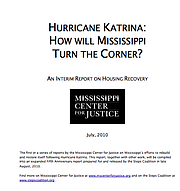Friday, May 1, 2020
U.S. Housing and Urban Development Secretary Shaun Donovan (center), Gov. Haley Barbour (right) and Mississippi Center for Justice Housing Director Reilly Morse in North Gulfport in 2010 to announce a $132 million settlement of the Mississippi Center for Justice’s lawsuit against HUD over diversion of housing funds to expand the State Port at Gulfport. Photo courtesy of Mississippi Center for Justice
Mississippi is at a crossroads on our recovery from the coronavirus pandemic. Our Legislature must be involved to ensure more balanced priorities and better financial accountability in the use of Mississippi’s CARES Act funds. Gov. Tate Reeves should partner with legislators to achieve an equitable and responsible pandemic response using taxpayer funds.
A “my way or the highway” approach runs the risk of insensitivity to the powerful generational forces of racial discrimination and economic oppression that have molded Mississippi society, including how disasters affect people of different races and classes. That’s exactly why we see higher than expected rates of illness and death among African Americans in our state from the coronavirus.
An equitable response will prioritize those who are most disadvantaged, but this will require top officials to lead from empathy for those whose lives and options are far different from their own. The more viewpoints involved, the more likely we will arrive at a solution for all Mississippians.
Transparency is needed to inform action and ensure success. After Hurricane Katrina, Gov. Haley Barbour blocked state accountability legislation and persuaded federal officials to waive his duty to equitably spend most of the $5 billion in disaster funds. His team also did not mandate collection of race data from those receiving recovery funds, thwarting the ability to trace racial disparities between need and distribution.
It took years to persuade Gov. Barbour to share more data, re-evaluate priorities, and achieve a more balanced and inclusive recovery. The lack of transparency concealed for years the suffering of thousands of households least able to recover on their own.
Without legislative involvement, Gov. Reeves alone will set the priorities. He should reach outside his team of loyalists to a broad spectrum of legislators and respect their role as a co-equal branch of government. Our system expects the Legislature to carry out the process to appropriate funds intended to alleviate the disruptions of the pandemic.
The governor also should reach across the aisle for leadership, as Gov. Barbour did in the formation of a Recovery Commission and the appointment of a former legislator and Biloxi mayor, Gerald Blessey, as his housing director.
Mississippi needs to be sure that funds intended to permit opportunities such as contact tracing, rural broadband or other pandemic-related solutions are not diverted to pursue an economic mirage. The traditional appropriations process can protect us against the reprogramming of funds before existing priorities are met to pursue unachievable visions such as the grandiose Port of the Future that Gov. Barbour championed, using federal money allocated for low-income housing after Hurricane Katrina. As we now know, job-creation forecasts around that port collapsed under public scrutiny, and the result was a bust in the creation of new direct maritime jobs.
We now stand before the barn door and can do something before the horse escapes. We should insist that our legislative and executive branches work together in a bipartisan vision to ensure an equitable and responsible recovery.
Reilly Morse is General Counsel of the Mississippi Center for Justice. Read more about COVID-19 in Mississippi at jacksonfreepress.com/COVID-19.
This essay does not necessarily reflect the views of the Jackson Free Press.


